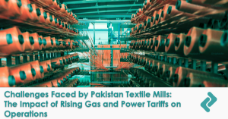
Challenges Faced by Pakistan Textile Mills: The Impact of Rising Gas and Power Tariffs on Operations
By Syeda Rida Shammas
The Pakistan textile mills have recently faced severe challenges, primarily due to the soaring gas and power tariffs. The situation has led to a significant downturn in operations, with numerous textile mills shutting down in the past 11 months. The All Pakistan Textile Mills Association (APTMA) has expressed deep concerns, warning of further closures unless immediate action is taken to alleviate the burden of these tariffs.
The electricity price for Pakistan textile mills has witnessed a staggering increase, jumping from Rs 20 to Rs 39.5 per unit. Unfortunately, the recent fiscal year budget has pushed these prices even higher, reaching Rs 49.5 per unit. APTMA has highlighted the adverse consequences of these tariff hikes, citing a 50% reduction in production capacity and the loss of approximately 7 million jobs within the textile sector. If the situation persists, the repercussions could be catastrophic, affecting over 10 million people across the country and resulting in a loss of 10 billion to annual imports.
Adding to the industry's woes, cotton production in Pakistan has plummeted to 5 million bales, necessitating the import of an additional 10 million cotton bales. Despite significant investments of $5 billion in expansion and new projects aimed at enhancing export capacity, the momentum toward achieving $26 billion in textile exports in 2023 is now under threat. The challenges faced by the cotton textile industry in Pakistan hinder its growth potential and impede progress toward becoming internationally competitive.
APTMA has emphasized that the textile industry in Punjab is burdened with exorbitant gas and electricity rates, negatively impacting its competitiveness. The disparity in prices between Punjab and Sindh further exacerbates the issue. EOUs (Export-Oriented Units) in Sindh enjoy more favorable conditions, as they can generate electricity at a significantly lower cost of Rs. 11/kWh, utilizing gas provided at $4/MMBtu. On the other hand, Punjab-based EOUs are subjected to gas/RLNG prices of $9/MMBtu and rely heavily on grid electricity, which costs over Rs. 40/kWh. This disparity not only renders Punjab-based industries uncompetitive but also affects the reliability and quality of their production.
To address these pressing challenges, APTMA has called for specific measures to ensure the survival and growth of the textile industry in Pakistan. The association urges the government to allocate Rs 104 billion in the budget for the textile industry, with Rs 40 billion for gas supply and Rs 64 billion for electricity. They advocate for a level playing field across the country, proposing a uniform gas price of $7 per MMBtu for the export industry. Additionally, APTMA stresses the importance of maintaining a consistent electricity rate of Rs 19.99/kWh for the export sector to preserve competitiveness both domestically and internationally. Priority access to gas supply for captive power plants within the export-oriented sector is also crucial.
The decline of Pakistan textile mills is a grave concern that requires immediate attention. The burden of rising gas and power tariffs has resulted in the closure of many textile mills, contributing to a significant reduction in production capacity and job losses. Urgent intervention from the government is essential to create a level playing field, harmonize gas prices, and maintain competitive electricity rates. By implementing these measures, Pakistan can safeguard its textile exports, protect employment, and prevent further deindustrialization in Punjab, ultimately contributing to a more stable balance of payments.
Zaraye - Revoluntionizing Sourcing Process for Textitle Industry
If you are looking for efficient and fast delivery of textile raw materials and finished goods then worry no further! Zaraye is a one-stop solution that helps buyers get the best prices with ease and convenience. The Zaraye B2B app connects buyers directly to sellers to ensure smooth delivery of textile materials and exports so you can conduct your industry operations in the best possible way.




